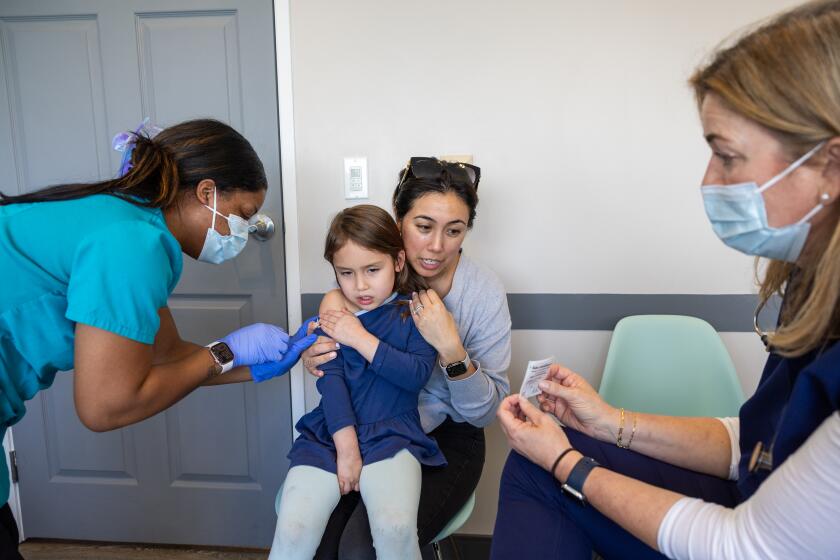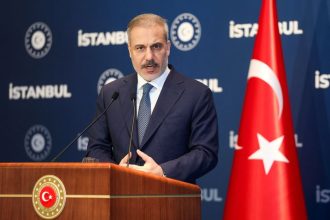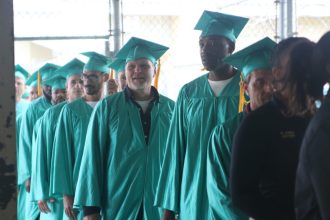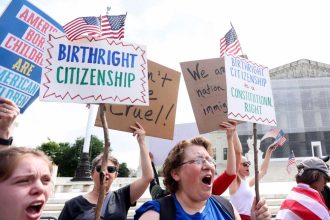A series of federal actions aimed at pressuring states to allow parents to opt out of school vaccine mandates for religious or personal reasons threatens to undermine California’s ironclad ban on such exemptions.
California is one of just five states that bans any non-medical exemptions, the result of a landmark 2015 law passed in the wake of the Disneyland measles outbreak. Connecticut, New York, Maine, and West Virginia have similar statutes.
The law is credited with bringing California’s rate of kindergartners vaccinated against the measles to 96.1% in the 2024-25 school year, up from 92.6% in 2014-15, even as the national rate declined. California is one of just 10 states with a kindergarten measles vaccination rate that exceeds the 95% threshold experts say is needed to achieve herd immunity.
If vaccine mandates are weakened, “we’re going to have more outbreaks, and schools are going to be less safe for the families who have children who are vulnerable,” said Dr. Eric Ball, a pediatrician in Orange County and chair of the American Academy of Pediatrics California.
Key actions to allow for vaccine exemptions include:
-
Legislation introduced in Congress last month would withhold federal education funding from states without religious exemptions.
-
A letter from the Department of Health and Human Services threatened to withhold federal vaccine funding from states that have any form of religious freedom or personal conscience laws but do not allow exemptions to vaccines. The move is “part of a larger effort by HHS to strengthen enforcement of laws protecting conscience and religious exercise.”
-
Several lawsuits winding their way through the courts from parents — including in California — seek the right to a religious exemption, which may eventually come before the Supreme Court.
Legal experts say that taken together, these moves reveal a concerted effort to chip away at limits states like California have placed on parents’ ability to send their unvaccinated children to school.
“We should assume that every aspect of the administration, at least three justices of the Supreme Court, and a significant contingent in Congress are actively trying to implement changes to the law that would invalidate California’s … approach to not allowing non-medical exemptions,” said Lindsay Wiley, a law professor at UCLA.
In West Virginia, the approach is already proving successful. Despite the state legislature recently rejecting a bill that would have permitted religious exemptions for the first time, Republican Gov. Patrick Morrisey signed an executive order allowing them, bolstered by a letter of support from HHS.
Vaccinations and syringes at Larchmont Pediatrics in Los Angeles. (Allen J. Schaben/Los Angeles Times)
“Vaccination is considered one of public health’s greatest achievements, preventing the spread of serious illnesses, reducing hospitalizations and saving lives,” the statement said. “CDPH remains committed to ensuring that all Californians continue to have access to safe and effective vaccines that are based on credible, transparent and science-based evidence.”
The federal actions are occurring in a moment of growing anti-vaccine fervor within the Trump administration. HHS Secretary Robert F. Kennedy, Jr. has long been an outspoken critic of vaccines, including the vaccine to prevent measles. As secretary of HHS, he has defunded mRNA research, limited COVID-19 shots to the elderly and those with preexisting medical conditions, and pledged to reveal a link between vaccines and autism.
California’s evolution on vaccine mandates
In 1961, California became one of the first states to permit residents to opt out of vaccines for a broad range of personal beliefs, as part of a law mandating the polio vaccine for school attendance.
For decades, few parents claimed the exemption, and the rate of children opting out of vaccines for non-medical reasons stayed around 0.5%, said Dr. Richard Pan, the former state senator who authored the 2015 law eliminating non-medical exemptions.
Pan said the rate of exemptions began to climb in the mid-2000s, when actress Jenny McCarthy appeared on Oprah and claimed that vaccines had caused her son’s autism. “But what really gave fuel” was the advent of Facebook and Twitter, said Pan. “Social media really connected people who are anti-vax and created an echo chamber.”
By the 2013-14 school year, 3.1% of California kindergartners were receiving a non-medical exemption to at least one required vaccine. The rate of kindergarteners fully vaccinated against the measles slipped to 92.3% — well below the 95% required for herd immunity.
Read more: A pediatrician’s dilemma: Should a practice kick out unvaccinated kids?
In 2014, a single measles case at Disneyland spread to more than 140 people across the country, an outbreak that epidemiologists said was fueled by vaccine refusals. In this moment of crisis, Pan introduced SB277, making California the first state in nearly 35 years to eliminate non-medical vaccine exemptions.
The legislation received the support of many parents, especially those whose children could not be vaccinated for medical reasons and relied on the immunity of people around them. “The whole purpose of 277 was actually to protect the rights and the freedoms of families and their children to get an education who could not get vaccinated,” said Pan.
Despite bitter debate, no major religious denominations opposed the bill, Pan said.
“This really isn’t about religion,” Pan said. “This is about trying to find a loophole or an excuse for someone who doesn’t want to vaccinate their child.”
Parents say California’s mandate violates religious beliefs
A contingent of parents say their sincere religious beliefs prevent them from getting their children vaccinated.
In 2023, Amy and Steve Doescher of Placerville brought a federal lawsuit, along with two other families, against California claiming that SB277 had violated their right to freely exercise their religion by preventing them from sending their 16-year-old daughter to public school.
The Doeschers, who attend a church near their home, “prayed extensively and consulted the Bible when deciding whether to vaccinate their children, and they arrived at the firm religious conviction that vaccinations violate their creed,” according to a complaint filed as part of the lawsuit.
Their daughter, who is enrolled in a charter school independent study program, is unable to have “the typical interactions with children that ‘normal’ children get. This has caused much stigma.”
Read more: Should babies get a ‘bonus dose’ of the measles vaccine? Doctors say it depends
The lawsuit alleges that her parents have had to enroll her in gymnastics classes and spend $10,000 per year on independent study costs, “to make up for the socialization shortcomings caused by SB277.”
While the lawsuit was dismissed in June, it is now on appeal at the 9th Circuit Court of Appeals. Lawyers in a similar New York lawsuit brought by Amish parents have requested review from the Supreme Court.
“I do think it’s a cumulative moment of change,” said Christina Hildebrand, president and founder of A Voice for Choice, an advocacy group that sponsored the California lawsuit.
“If vaccines are so effective and they don’t have risk involved, then people should want to get them,” she said. “How good really is the product if you’re having to put a mandate on them?”
UCLA Law’s Wiley said she is sympathetic to sincere religious objectors, and herd immunity can still be reached even if a small number of people opt out. The problem, she said, is that they’re difficult for states to police for validity and “can really open the floodgates to vastly diminished vaccination rates.”
Dorit Reiss, a law professor at the University of California at San Francisco who studies vaccines, said religious exemptions are often “used as a fig leaf for people who have safety concerns. The way the system works is that it privileges the good liars.”
As part of her research, she has found “a whole industry of people trying to help each other get exemptions” online, including those who offer sample requests to parents and workshops on how to claim a religious exemption for non-religious reasons.
Reiss points to numerous studies finding that making exemptions broader and easier to get tends to lead to lower vaccination rates and more outbreaks.
The volatile landscape for vaccine mandates
Since the COVID pandemic, states across the country have experienced a decline in the rate of kindergartners who are fully vaccinated, and an increase in parents seeking exemptions, according to a recent report from KFF, a nonprofit health research group.
Last week, Florida’s surgeon general announced the state would no longer require children to be vaccinated in order to attend public school, something that all 50 states currently require.
Threats are also mounting from Washington, D.C. The GRACE Act, which was introduced in Congress last month by Rep. Greg Steube (R-FL), would withhold federal education funding from any state that does not offer parents the right to opt out of vaccines for religious reasons.
The bill, if eventually approved and signed into law by President Trump, would also explicitly prevent states, including California, from requiring any documentation from parents to prove a sincere religious conviction against vaccines.
“Freedom of speech and religion is the most sacred right guaranteed under our Constitution,” Rep. Steube said in a statement to The Times. “No student or their family should ever be coerced into sacrificing their faith or jumping through loopholes to comply with a vaccine requirement.”
Last week, Kennedy weighed in on the issue. He said in a letter that if a state already has statutes on the books protecting religious freedom or personal conscience in any form, those laws must extend to vaccine opt-outs. If states with such laws do not comply with the directive, they could lose funding for the federal Vaccines for Children Program, which funds vaccines for low-income children.
California does not have religious freedom or personal conscience statues. But 29 other states have passed religious freedom laws, and 18 have parental rights laws, which legal experts said could be used by the federal government to compel states to offer vaccine opt-outs.
“States have the authority to balance public health goals with individual freedom, and honoring those decisions builds trust” Kennedy wrote. “Protecting both public health and personal liberty is how we restore faith in our institutions and Make America Healthy Again.”
Several legal experts said the approach was alarming.
“I’m very concerned that this is part of a playbook where they’re going on a state and federal level, to push on these laws,” said Richard Hughes, a lawyer with Epstein Becker Green in Washington, D.C., who has been working on vaccine law for two decades. “This is a massive federal overreach, and it’s incredibly inappropriate.”
This article is part of The Times’ early childhood education initiative, focusing on the learning and development of California children from birth to age 5. For more information about the initiative and its philanthropic funders, go to latimes.com/earlyed.
This story originally appeared in Los Angeles Times.









